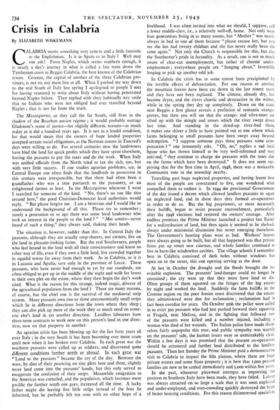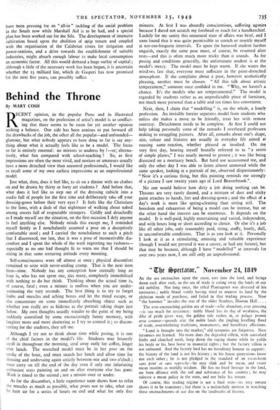Crisis in Calabria
By ELIZABETH ‘VISKEMANN
CALABRIA seems something very remote and a little fantastic to the Englishman. Is it in Spain or in Italy ? Well may one ask! From Naples, which seems southern enough, it is nearly a day's journey in what is called a fast train down the Tyrrhenian coast to Reggio Calabria, the best known of the Calabrian towns. Cosenza, the capital of another of the three Calabrian pro- vinces, is not on any main line at all. When I pushed my way down to the real South of Italy last spring I apologised to people I met for having ventured to write about Italy without having penetrated beyond Naples before. They replied with their habitually wry smile that no Italians who were not obliged had ever travelled beyond Naples ; that is not far from the truth.
The Mezzogiorno, as they call the far South, still lives in the shadow of the Bourbon ancien rigime ; it would probably outrage Gladstone's sense of justice—for slightly different reasons—as much today as it did a hundred years ago. It is not in a feudal condition, for that would mean that the owners of huge landed properties accepted certain social obligations, as the Norman counts in Tancred's days were willing to do. For several centuries now the landowners have bled the land for quick profits which they have spent elsewhere, leaving the peasants to pay the taxes and do the work. When Italy was unified officials from the North tried to tax the rich, too, but with very little success. If one studies agrarian problems, say, in Central Europe one often finds that the landlords in possession in this century were irresponsible, but that there had often been a grandfather who was a true patriarch to the peasantry, or an enlightened farmer at least. In the Mezzogiorno wherever I went I searched for someone of the kind. "No, there's no one like that around here," the good Christian-Democrat local authorities would reply. "But please forgive me. I am a historian and I would like to understand the background of all this. Please try to remember ; surely a generation or so ago there was some local landowner who took an interest in the people or the land ? " "Mai semito—never heard of such a thing," they always said, shaking their heads.
The situation is, however, sadder than this. In Central Italy the peasants, although they are usually crop-sharers, not owners, live on the land in pleasant-looking farms. But the real Southerners, people who feel bound to the land with all their consciousness and know no other way of life, even if they own a little land, live crowded together in squalid towns far away from their work. As in Calabria, so it is in Lucania and Apulia, save only in the province of Lecce. These peasants, who have never had enough to eat by our standards, are often obliged to get up in the middle of the night and walk for hours to their own plot on the estate, where they then begin the day's work tired. What is the reason for this strange, indeed tragic, divorce of the agricultural population from the land ? There are many reasons, of course, but the chief one is the survival of the mediaeval strip system. Many peasants own two or three uneconomically small strips which lie in different directions from the town where they sleep ; they can also pick up more of the work they so much need on some- one else's land in yet another direction. Landless labourers have short-term contracts to work now on this person's land in one direc- tion, now on that property in another.
An agrarian crisis has been blowing up for the last forty years all over Italy ; in the very South it has been becoming ever more acute until now when it has broken over Calabria. In each great war the southern peasants were called up as soldiers, and discovered quite different conditions further north or abroad. In each great war "Land to the peasants" became the cry of the day. Between the wars, by dint of their pouncing on tiny plots here and there, slightly more land came into the peasants' hands, but this only served to exaggerate the confusion of their strips. Meanwhile emigration to the Americas was curtailed, and the population, which becomes more prolific the further south one goes, increased all the time. A lucky father might die leaving five little strips instead of the four he inherited, but he probably left ten sons with no other hope of a
livelihood. I was often invited into what we should, I suppose, call a lower middle-class, i.e., a relatively well-off, home. Not only were four generations living in as many rooms, but " Mother " was nearly always in bed in one of them because "please excuse her, but you see she has had twenty children and she has never really been the same again." Not only the Church is responsible for this, but also the Southerner's pride in fecundity. As a result, one is not so much aware of clear-cut unemployment, but rather of chronic under- employment ; everywhere people are "hanging about," feverishly longing to pick up another odd job.
In Calabria the crisis has to some extent been precipitated ty the terrible effects of deforestation. For one reason or another the mountain forests have been cut down in the last ninety years and they have not been replaced. The climate, already dry, has become dryer, and the rivers chaotic and destructive in the winter, while in the spring they dry up completely. Down on the coast near Reggio a first glance reveals a profusion of romantic orange- groves, but then you will see that the orange- and olive-trees are silted up with the shingle and stones which the river swept down last time. And standing in the dried-up river-bed there, it makes one shiver a little to have pointed out to one where whole farms belonging to small peasants have been swept away beyond redemption. "I suppose someone pays these peasants some com- pensation ? " one innocently asks. "Oh, no," replies a sad local figure who has shown himself to be very well-informed and very anti-red, "they continue to charge the peasants with the taxes due on the farms which have been destroyed." It does not seem sur- prising that for the first time in April, 1948, there was a noticeable Communist vote in the township nearby.
Travelling past huge neglected properties, and having learnt how most of the people are constrained to live, one wondered what compelled them to endure it. In 1944 the provisional Government of the day issued a decree which allowed landless peasants to squat on neglected land, and in those days they formed co-operatives in order to do so. But the big proprietors, or more accurately their bailiffs, began to resist peasant encroachment, particularly after the 1948 elections had restored the owners' courage. After endless promises the Prime Minister launched a project last Easter for a redistribution of land, but then again it seemed to be shelved, always under ministerial discussion hut never emerging therefrom. The Government's housing plans were as bad. Workers' houses were always going to be built, but all that happened was that private firms put up smart new cinemas, and whole families continued to live in barn-like windowless cavities. The village schools I remember best in Calabria consisted of dark holes without windows but open on to the street, this one opening serving as the door.
At last in October the drought and the floods brought the in- evitable explosion. The peasants' land-hunger could no longer be contained ; the cry went up that they must have land or die. Often groups of them squatted on the fringes of the big estates by night and worked the land. Suddenly the farm bailiffs in the Crotone region on the poor Ionian coast discovered that the estates they administered were due for reclamation ; reclamation had in fact been overdue for years. On October 30th the police were called in to evict 300 peasants who had just pushed forward their squatting at Fragali, near Melissa, and in the fighting that followed two of the peasants were killed and a number injured, including A woman who died of her wounds. The Italian police have made them- selves fairly unpopular this year, and public sympathy was warmly on the peasants' side, the human issues were so unmistakably clear. Within a few days it was promised that the peasant co-operatives should be reinstated and further land distributed to the landless peasants. Then last Sunday the Prime Minister paid a demonstrative visit to Calabria to inspect the Sila plateau, where there are huge private estates and some State property ; it is here that r,000 peasant families are now to be settled immediately and 5,000 within five years.
In the past, whenever piecemeal attempts at improving the position in Southern Italy have been made, they have failed. Labour was always attracted on so large a scale that it was soon exploited and under-employed, and over-crowding quickly destroyed the hope of better housing conditions. For this reason disinterested specialists
have been pressing for an "all-in" tackling of the social problem in the South now while Marshall Aid is to be had, and a special plan has been worked out for the Sila. The development of intensive cultivation based upon the abolition of strip tenure and coupled with the organisation of the Calabrian rivers for irrigation and power-stations, and a drive towards the establishment of suitable industries, might absorb enough labour to make local consumption an economic factor. All this would demand a huge outlay of capital ; although a little of the necessary work has been begun, it is uncertain whether the 55 milliard lire, which de Gasperi has now promised for the next five years, can possibly suffice.







































 Previous page
Previous page